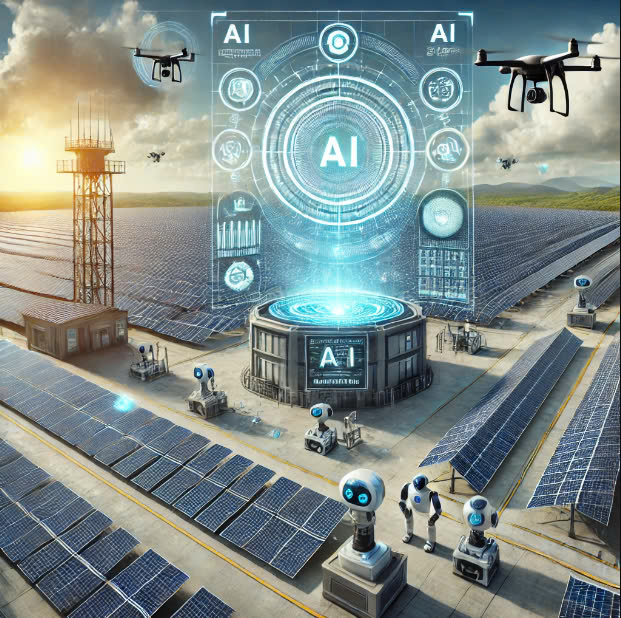Artificial Intelligence (AI) is gradually transforming the way the solar energy industry operates, from production and deployment to management and optimization of systems. The combination of AI technology and solar energy not only helps optimize electricity production efficiency but also plays a crucial role in reducing costs and improving the reliability of renewable energy systems.

In recent years, the integration of AI into the solar energy sector has made significant strides, with a wide range of applications, especially in large-scale projects. One of the most important applications of AI in this industry is its ability to optimize system performance. With the help of machine learning algorithms, solar energy systems can monitor and analyze real-time data about weather conditions, solar radiation levels, and the performance of solar panels. Based on this information, AI can automatically adjust technical parameters to achieve optimal performance.
For instance, in large-scale solar farms, AI can predict electricity production based on weather data and light conditions. If AI detects unfavorable weather conditions or anomalies in the system, it can adjust the angle of the solar panels or automatically shut down certain components to protect the system from damage. As a result, maintenance and repair costs are significantly reduced, while the operational performance of solar farms is maximized.
In addition to optimizing performance, AI plays a crucial role in managing and monitoring solar energy systems. By using sensors and intelligent monitoring systems, AI can continuously collect data from solar panels and inverters, detecting issues such as performance degradation, malfunctions, or technical faults. AI-based management systems can identify minor problems before they become serious, helping to save time and costs for maintenance and repairs.
Moreover, AI is also essential for integrating solar energy into smart grid systems. Accurately predicting energy production from renewable sources like solar power is a significant challenge for grid systems due to the unpredictable variability of weather conditions. However, with the support of AI, grid management systems can anticipate solar energy production levels, helping to balance supply and demand and ensure energy security. This is particularly important as renewable energy continues to represent a growing share of global electricity production.
As solar energy continues to develop robustly, integrating AI into renewable energy systems not only addresses performance and maintenance issues but also plays a critical role in optimizing energy distribution and consumption processes. This is especially important as the world moves towards achieving zero-carbon goals by the middle of the 21st century, with renewable energy sources like solar power playing a central role in this transition.
In Vietnam, although AI in the solar energy sector is still in its infancy, there are positive signs of increasing interest in this technology. Many large-scale solar projects are beginning to apply AI solutions to optimize performance and manage systems. Embracing and implementing AI will not only enhance the competitiveness of renewable energy enterprises but also contribute to Vietnam achieving its sustainable development goals in the future.
In summary, AI is and will continue to play a key role in the development of the solar energy industry. With its ability to improve performance, reduce costs, and enable intelligent management, artificial intelligence promises to create a significant leap forward for the renewable energy sector, particularly solar energy, on the path towards a sustainable future.
Hotline
Hotline